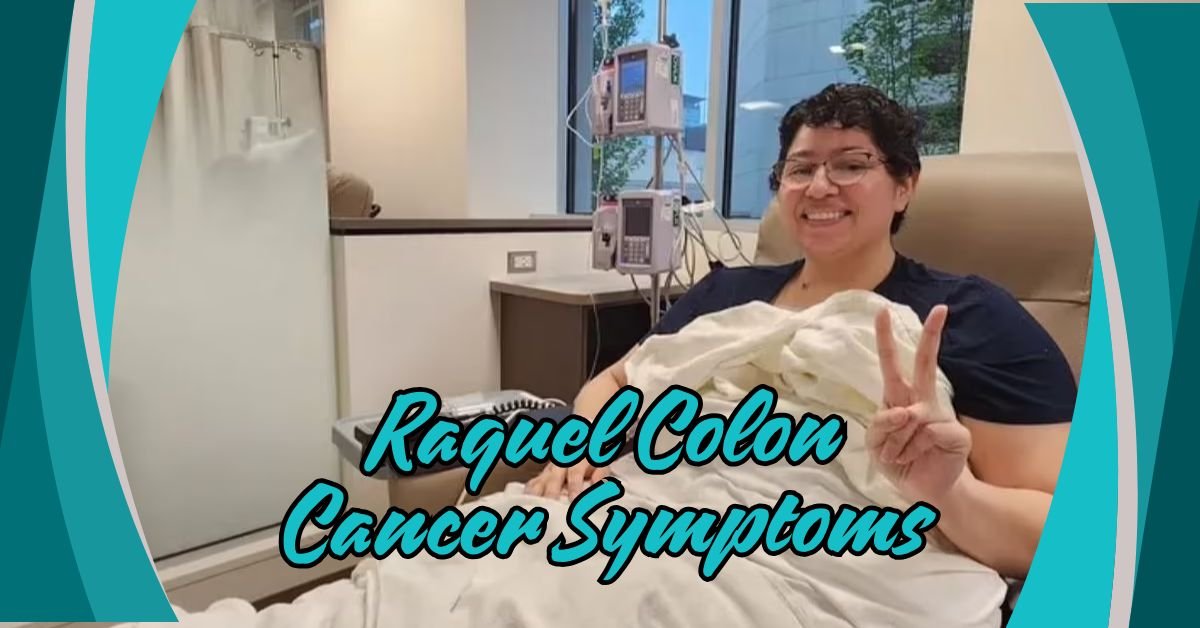Colon cancer is a type of cancer that begins in the large intestine (colon) or the rectum. It is one of the most common cancers worldwide, affecting both men and women. Early detection of colon cancer significantly improves the chances of successful treatment and survival. Understanding the symptoms associated with colon cancer is crucial, as many of these signs may be subtle and easy to overlook. In this article, we’ll explore the symptoms of colon cancer, with a specific focus on Raquel colon cancer symptoms, to help you identify potential warning signs and take timely action.
What Are the Common Symptoms of Colon Cancer?
Colon cancer symptoms can vary widely depending on the cancer’s stage and location in the colon or rectum. While some individuals may experience clear and noticeable signs, others may not show symptoms until the cancer has progressed. The most common symptoms include:
- Abdominal Pain or Discomfort: One of the most frequent symptoms, abdominal pain, can range from mild cramping to persistent discomfort. Pain may worsen after eating or be accompanied by bloating.
- Changes in Bowel Movements: If you notice significant changes in your bowel habits, such as diarrhea, constipation, or a feeling of incomplete bowel emptying, these could be signs of colon cancer.
- Blood in Stool: Finding blood in your stool, whether bright red or dark, could indicate colon cancer. This symptom should not be ignored, as it can also be linked to other gastrointestinal conditions.
- Unexplained Weight Loss: Sudden and unexplained weight loss, often without any change in diet or exercise, can be a sign of colon cancer, as the body may begin to use energy inefficiently when fighting the disease.
- Fatigue: Colon cancer can lead to severe fatigue, which may be caused by anemia from blood loss in the intestines or the body’s efforts to fight the cancer.
- Nausea or Vomiting: Some individuals with colon cancer may experience persistent nausea or vomiting, particularly if the tumor is causing a blockage in the colon.
Early Warning Signs of Colon Cancer in Women
While the common symptoms of colon cancer affect both men and women, there are certain signs that may be more prominent in women. Women may experience colon cancer differently, making it essential to be aware of these variations. For example, some women might experience symptoms that mimic irritable bowel syndrome (IBS) or other gastrointestinal issues, which could delay diagnosis.
In addition to the usual symptoms like abdominal pain, changes in bowel movements, and weight loss, women may also experience:
- Pelvic Discomfort: Pelvic discomfort or pain may be a more common symptom in women, as colon cancer can affect the lower parts of the colon, which are near the ovaries and uterus.
- Changes in Menstrual Cycle: Although not a typical symptom, some women with colon cancer may notice changes in their menstrual cycle. This could be linked to changes in hormone levels or the stress caused by the illness.
- Back Pain: Lower back pain is often associated with various conditions, but in women with colon cancer, it can be a sign that the tumor has spread to nearby organs or tissues.
- Bloating or Fullness: Persistent bloating and a feeling of fullness, even after eating only small meals, can be an early symptom in women, especially in cases where the cancer affects the sigmoid colon.
How Abdominal Pain Could Be a Sign of Colon Cancer
Abdominal pain is one of the most common complaints among individuals diagnosed with colon cancer. However, this symptom can be easily confused with other less serious conditions, such as indigestion, gas, or even IBS. The key difference is that in colon cancer, abdominal pain is often persistent and may be accompanied by other symptoms like changes in bowel movements or unexplained weight loss.
If the pain is localized to a specific area, especially in the lower abdomen, it could indicate a problem with the colon. As the cancer grows, it can obstruct the intestines, causing bloating and cramping. The pain can also worsen as the tumor presses against surrounding tissues and organs.
Changes in Stool: A Key Indicator of Colon Cancer
Changes in stool are among the earliest signs of colon cancer. These changes may include:
- Blood in Stool: One of the most telling signs of colon cancer, blood in the stool can range from bright red to dark and tarry. Blood may appear as streaks on the stool or make the stool look darker than usual.
- Changes in Consistency: A noticeable change in the consistency of your stool, whether it becomes harder, more liquid, or you begin experiencing frequent bouts of diarrhea or constipation, can be a warning sign.
- Incomplete Bowel Movements: A feeling that your bowel is not fully emptied after a bowel movement can also signal colon cancer. This feeling of urgency or incompleteness may be caused by a blockage or obstruction in the colon.
- Narrow or Thin Stool: Stool that is narrower or thinner than usual can indicate that a tumor in the colon is obstructing the passage of stool. This may result in difficulty passing stool or noticeable changes in shape.
Raquel Colon Cancer Symptoms: How to Recognize the Early Stages
Understanding Raquel colon cancer symptoms is crucial for identifying potential issues early. While symptoms may vary between individuals, certain early signs may signal the onset of colon cancer. If you or someone you know is experiencing any of the following:
- Persistent Digestive Issues: Ongoing digestive discomfort, such as bloating, constipation, or diarrhea, especially if it persists for more than a few weeks, should be investigated further.
- Unexplained Weight Loss: If you experience significant weight loss without any dietary changes or physical activity increase, this could be a warning sign.
- Blood in Stool: Any presence of blood in the stool should be evaluated by a doctor to rule out colon cancer or other gastrointestinal disorders.
It’s important to consult a healthcare professional as soon as these symptoms appear. Early diagnosis of colon cancer can greatly increase the chances of effective treatment and recovery.
What Happens After a Colon Cancer Diagnosis?
If you are diagnosed with colon cancer, it’s natural to feel overwhelmed. However, understanding the next steps and treatment options can help you prepare. Following diagnosis, your doctor will likely recommend one or more of the following:
- Surgery: In many cases, surgery is required to remove the tumor. This can involve removing a part of the colon or rectum.
- Chemotherapy: Chemotherapy may be recommended either after surgery or as a primary treatment if the cancer has spread to other areas.
- Radiation Therapy: In some cases, radiation therapy may be used to target cancer cells or shrink tumors before surgery.
- Targeted Therapy and Immunotherapy: For certain patients, newer treatment options such as targeted therapies or immunotherapies may be available.
Each treatment plan is personalized to the patient’s condition, and the healthcare team will discuss the best options based on the cancer’s stage and location.
Risk Factors That Increase the Likelihood of Colon Cancer
While anyone can develop colon cancer, certain risk factors may increase the likelihood. These include:
- Age: The risk of colon cancer increases with age, particularly after the age of 50.
- Family History: Having a family member with colon cancer or other related cancers increases the risk.
- Diet: A diet high in red meats and processed foods can increase the risk, while a diet rich in fiber, fruits, and vegetables can reduce it.
- Genetic Conditions: Conditions like Lynch syndrome or familial adenomatous polyposis (FAP) increase the risk of colon cancer.
- Inactivity: A lack of physical activity is a major risk factor for many types of cancer, including colon cancer.
- Smoking and Alcohol: Smoking and heavy drinking are significant risk factors for colon cancer.
How to Diagnose Colon Cancer: Medical Tests and Procedures
Colon cancer is diagnosed through a combination of physical exams, laboratory tests, and imaging procedures. Some common diagnostic methods include:
- Colonoscopies: The gold standard for diagnosing colon cancer, a colonoscopy involves using a camera to inspect the inside of the colon and rectum for abnormalities, such as tumors or polyps.
- Blood Tests: Blood tests can reveal signs of anemia (a possible result of blood loss in the colon) or elevated levels of certain markers like carcinoembryonic antigen (CEA), which can indicate cancer.
- CT Scans: CT scans or other imaging tests may be used to assess the extent of the cancer and whether it has spread to other organs.
Preventing Colon Cancer: Lifestyle Tips and Healthy Habits
While colon cancer cannot always be prevented, certain lifestyle changes can reduce the risk. Here are some ways to decrease your risk:
- Eat a Healthy Diet: A diet rich in fruits, vegetables, and fiber, and low in red meats and processed foods, can reduce the risk of colon cancer.
- Exercise Regularly: Maintaining a healthy weight and staying active can lower the chances of developing colon cancer.
- Avoid Smoking and Limit Alcohol: Quitting smoking and drinking alcohol in moderation can significantly reduce your cancer risk.
- Get Regular Screenings: Regular screenings, such as colonoscopies, are crucial for detecting colon cancer early, especially if you have a family history or other risk factors.
Conclusion: Recognizing Raquel Colon Cancer Symptoms Early Could Save Lives
Colon cancer is a serious illness, but when caught early, it is treatable. By understanding the symptoms and risk factors associated with colon cancer, such as Raquel colon cancer symptoms, you can take proactive steps to monitor your health. Always consult a healthcare professional if you notice any unusual symptoms or changes in your body. Early detection and timely treatment are key to improving outcomes and survival rates.
FAQs About Raquel Colon Cancer Symptoms
- What are the earliest symptoms of colon cancer? Early symptoms of colon cancer include changes in bowel habits, abdominal pain, and blood in the stool.
- Is blood in stool always a sign of colon cancer? No, blood in stool can be caused by other conditions like hemorrhoids or gastrointestinal infections. However, it should be evaluated by a doctor.
- How is colon cancer diagnosed? Colon cancer is diagnosed through colonoscopies, blood tests, and imaging tests like CT scans.
- What are the risk factors for colon cancer? Risk factors include age, family history, diet, lack of exercise, and smoking.
- Can colon cancer be prevented? While it cannot always be prevented, a healthy lifestyle, including a balanced diet, regular exercise, and avoiding smoking, can reduce your risk.
- How is colon cancer treated? Treatment options for colon cancer include surgery, chemotherapy, radiation therapy, and targeted therapies.
- What should I do if I notice colon cancer symptoms? If you notice symptoms like abdominal pain, changes in bowel movements, or blood in your stool, consult a healthcare professional for evaluation.

Alex Taylor is a seasoned writer and editor with over 5 years in digital media, specializing in practical home maintenance guides and homeowner tips. From heating system upkeep to seasonal repair checklists, Alex blends clear, relatable advice with real-world experience to help readers protect their homes and budgets. He personally reviews and fact-checks every article in his areas of expertise to ensure accuracy, clarity, and real-world usefulness. His work also spans tech, culture, fashion, sports, and lifestyle—always with a focus on clarity, relevance, and reader value.

